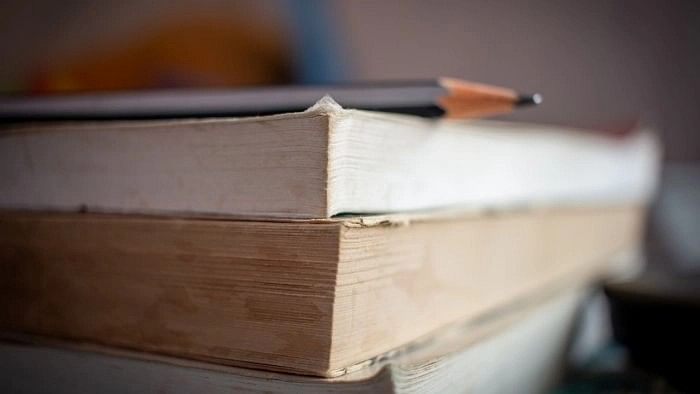
Representative image of education
Credit: iStock Photo
It was surprising that the Bharatiya Janata Party (BJP)-led Union government, now about to complete a decade in power, has not taken immediate action on the contentious question of syllabi and textbooks in the CBSE schools.
As we know, the BJP government in Karnataka did not hesitate to do a hit-and-run job on the state’s textbooks as soon as it assumed power in July 2019. Now, the Siddaramaiah-led Congress government has shown alacrity in reversing those changes.
The Union government chose, instead, to tweak the existing NCERT books, once more deleting and dropping, and in some cases revising chapters, sections, and words that it deemed unacceptable. The NCERT books (as well as some privately published books) are used in CBSE schools, which constitute a small proportion of schools nationwide (about 27,000). In addition, 23 states had adopted NCERT books from Class 1 to Class 12.
Boldest revision
The textbooks, especially the ones prepared in the 2005/6 period as part of the National Curriculum Framework (NCF) were arguably part of the boldest and most thoughtful post-Independence initiatives in redrafting syllabi and textbooks. Not only did the committees, under the leadership of Professors Yash Pal and Krishna Kumar, include representatives of institutions of advanced learning, the NCERT’s own faculty, school teachers, and non-governmental organisations, but self-conscious effort was made — particularly in the social sciences and humanities with which I am more familiar — to include new ways of thinking about old subjects, as a reflection of an increasingly inclusive and sensitive society. This meant pursuing pedagogical, and not ideological goals.
The history books, easily the most contentious today and the ones that have been most systematically undermined by the Narendra Modi-led Union government, encouraged students to think historically. Students were exposed to often contradictory historical sources on major Indian and international events, to show them the ways in which professional historians think, weigh (conflicting) evidence, etc.
Every effort was made to include regions, figures, and themes that previous ‘Indian’ histories had ignored. The North-East, pastoralists, and histories of print culture, sport, and clothing were included, dramatically altering the staid old political histories of previous times.
New questions were asked about familiar events: did women also experience the French Revolution in the same way as men? The chronological narrative yielded complex and interesting thematic histories, and, perhaps, placed more of a burden on teachers than the system had prepared them for.
A legitimation exercise
The recent announcement of the new panel to oversee the writing of NCERT textbooks is also puzzling. Why does it not include Dinanath Batra, the man who not only supervised the entire Vidya Bharati School system, but also persistently pursued cases against syllabi, books, chapters, etc. that he felt did not conform to Hindutva’s project of presenting a glorious ancient past, untroubled by conflict or dissension — until, that is, the Muslims came along? He met with remarkable success in each of his public postulations, and his books were prescribed in Gujarat.
No marks then for figuring out that the new NCERT panel is a legitimation exercise par excellence, which once more orientates school learning to ideological, rather than pedagogical, goals. Why ‘legitimation’? That’s because several of the 19 members in the panel are indeed people of eminence in various spheres of public life, and a few are drawn from academia. But knowledge of all the challenges that confront the Indian classroom today is not their forte. They will be assisted in their task, we are told, by several others.
Will the panel…?
We need then to ask, of this power-packed panel: will it be able to urgently address the multitude of problems that are faced by school teachers/administrators and, of course, school children? Will it restore to the heart of school education a joy of learning? This may seem like a laughable goal, given the very sorry state of our schooling system — government or private — and the groundswell of parental support for exam-driven learning.
Will this 19-member panel strengthen experience-based learning, which also acknowledges the wide range of ecosystems within which schools (and children) are located? Unlikely, given the ‘centralising’ direction in which we are going. Will it be able to bring back a sense of compassion, and a capacity for toleration among our young, that has been driven from public life over the last decade? Will it set the ground for a sorely needed healing of the Indian people, from whom the worst values and behaviours have been wrested?
Will the panel provide relief to the victims of those seeking only retribution and revenge? Will it be able to bring to the classroom a spirit of curiosity about the world, and a capacity for dreaming of another possible future? Finally, dare we confront our children with the possibility of being Indian without necessarily being nationalist?
No pushback this time
One fears that the distinguished panel will not allow its eminence to come in the way of obedience to its masters. If the recent determined moves of the Union government are an indication, we are poised on the brink of what will arguably be a tectonic shift in elementary and secondary education as we saw in 2005. This time, as spirited a pushback against the new books, as was undertaken with such thoroughness by the Right, may be made impossible.
(Janaki Nair is Professor (retd) of Modern Indian History, Centre for Historical Studies, Jawaharlal Nehru University, Delhi.)
Disclaimer: The views expressed above are the author's own. They do not necessarily reflect the views of DH.